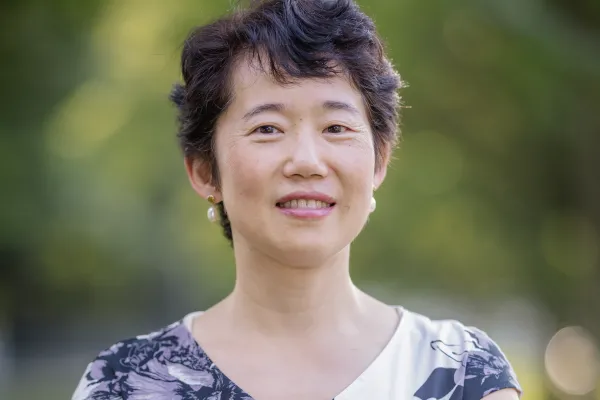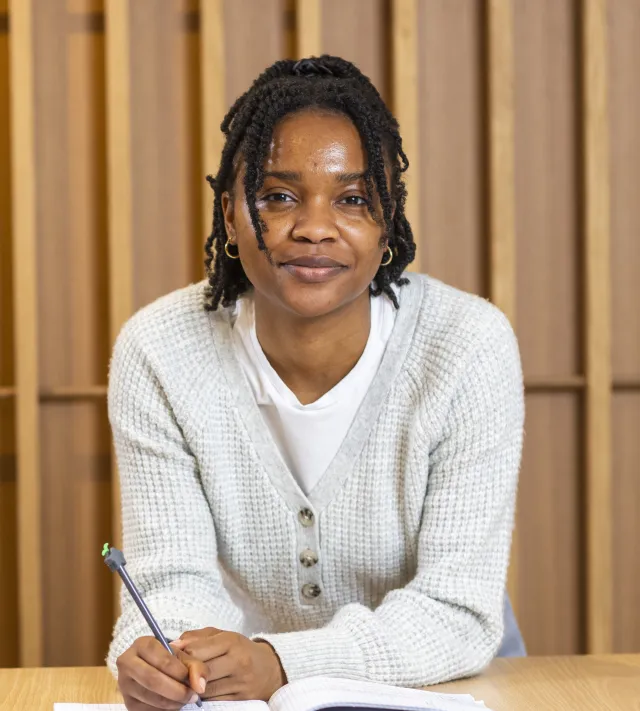Generation to Generation: Financial Aid Pushes the World Forward
Alum News
Groundbreaking cancer researcher Xiaole Shirley Liu ’97 gives to financial aid so that Smithies can achieve their dreams
Published September 27, 2024
Financial aid made it possible for Xiaole Shirley Liu ’97 to study biology and computer science at Smith, and now her groundbreaking immuno-oncology company is edging closer to discovering a cancer cure. When she graduated, she vowed to give back to Smith so that other students could benefit from a Smith education.
She has made good on that promise by donating to Smith’s Here for Every Voice scholarship initiative. The endowed scholarship fund that Liu established with a giving circle of Smith friends supports current and future students with big dreams, like biology major Adline Dely ’26, who wants to decipher the mysteries of life by delving into the “fascinating world where genetics, molecular biosciences, and chemistry intersect.”
Generation to generation, Smithies are giving back to support current and future students as they work toward careers that will shape the world.
Finding a Cure
As a world-leading computational biologist, Liu was a professor at the Dana-Farber Cancer Institute and Harvard before launching GV20 Therapeutics. Her company’s lead program is the world’s first clinical study on an AI-designed antibody drug against an AI-predicted novel target, which works by boosting patients’ immune systems to kill cancer cells.
“Our research found that cancer patients make anti-tumor antibodies in their tumors already,” explains Liu, who earned her Ph.D. at Stanford. “But they just don't make enough. We have hundreds of millions of antibodies from tens of thousands of patient tumors, and we use AI to predict the ones with therapeutic potential. We found such an antibody and brought it to the clinic. The drug has shown good safety and preliminary efficacy in our phase 1 clinical trial.”
Liu’s research could revolutionize cancer treatment and profoundly impact millions of people. She traces her start back to Smith and the financial aid she received. “I couldn’t even consider coming to Smith without a scholarship,” Liu says. “I felt very lucky.”
“The anti-cancer drug that I’m working on now results from an integration of cancer immunology, genomics technologies, and artificial intelligence. And I definitely credit Smith for that.”
At Smith, Liu had to quickly boost her English language proficiency, carrying a cassette recorder to her classes so that she could relisten to the lectures and discussions each evening. She was introduced to hands-on lab research and computer literacy, ultimately deciding to double major in biochemistry and computer science.
“If I hadn’t received financial aid to come to Smith, and if I hadn’t earned my double major in biochemistry and computer science, I would never have pursued computational biology at Stanford,” Liu says. “And then developed my career in computational biology research and entrepreneurship. The anti-cancer drug that I’m working on now results from an integration of cancer immunology, genomics technologies, and artificial intelligence. And I definitely credit Smith for that.”
Unlocking Bio Mysteries
Dely, a first-generation college student from Boston, has also found inspiration in Smith’s research labs. “I'm studying the intricate sciences that form the basis of life, both in humans and plants,” she says. “When I first came to Smith, I thought I'd end up in the medical field, but my journey here has led me to discover a passion for research. It's a field that used to intimidate me, but now I find it incredibly interesting.”
As an Achieving Excellence in Mathematics, Engineering and Sciences Scholar (a program that pairs students from groups historically underrepresented in STEM fields with faculty to undertake a research project), Dely has teamed up most recently with the Botanic Garden’s Director John Berryhill and Manager of Education Sarah Loomis to explore how botanic gardens can conserve global botanical diversity and mitigate biodiversity loss.
During the summer of 2024, Dely was an intern at the Royal Botanic Gardens in Kew, England, one of two Smithies selected for this program which is funded through an endowment established in honor of Muriel Kohn Pokross class of 1934. The 12-week internship gave Dely an opportunity to conduct plant research and enhance her laboratory skills. “Immersing myself in the world's premier botanic garden will enable me to address the [climate] crisis, build valuable skills, and gain knowledge for the future,” Dely says.
“Financial aid means more people can pursue their dreams and reach their full potential. It’s not just about giving money; it’s about giving someone a chance to build a better future for themselves, their families, and the world.”
Dely chose Smith because of the generous financial aid package she received. “College is expensive,” she says. “Financial aid at Smith meant that I could pursue my education without worrying too much about the financial burden on my family.”
Giving Circles and the Cycle of Giving
In keeping with Liu’s personal pledge to give back to Smith, in 2022 she contacted a small group of Smithie friends, inviting them to join her and make a collective, endowed scholarship gift. Giving circles are a powerful philanthropic option, offering structural flexibility—individuals give what they can—while as a group attaining the amount needed for an endowed fund. Endowed gifts are invested, so they continue to grow over time.
For this giving circle, named after two of the group’s favorite Smith professors, there was the added benefit of reconnecting with friends as they discussed the gift’s focus and relived shared Smith memories.
“When you’re thriving in the world, that’s the time to think about giving back to Smith,” Liu says. “Smith gave us the daring to express our own views and honed our technical skills to earn our independence and build our careers. I see Smith continuing this tradition of nurturing future women leaders and innovators.”
Dely believes that financial aid can change lives. “It means more people can pursue their dreams and reach their full potential,” she says. “It's not just about giving money; it's about giving someone a chance to build a better future for themselves, their families, and the world.”
The Here for Every Voice: Generation to Generation initiative has galvanized Smithies of all ages, eager to make a Smith education accessible to today’s and future students. For many donors, this is the first time they have contributed to an endowed fund. Endowed gifts, whether individual or collective, qualify for the Generation to Generation Gift Matching Program, increasing the impact of the donation. Learn more at smith.edu/access.
To make a gift, please contact Betsy Carpenter ’93, associate vice president for development, at ewcarpen@smith.edu or 413-585-2052.

